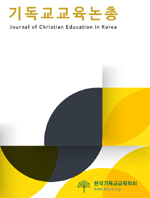- 영문명
- A Study on the Core Tasks of Christian Humanities Education in the Post-Era
- 발행기관
- 한국기독교교육학회
- 저자명
- 장신근(Shin-Geun Jang)
- 간행물 정보
- 『기독교교육 논총』제83집, 9~38쪽, 전체 30쪽
- 주제분류
- 인문학 > 기독교신학
- 파일형태
- 발행일자
- 2025.09.30

국문 초록
연구 목적: 본 연구의 목적은 포스트 시대의 맥락에서 대안적 기독교 인문학교육의 실천을 위한 핵심 과제를 제안하는 것이다.
연구 내용 및 방법: 본 연구는 문헌연구를 중심으로 이루어지며, 학제적 대화를 지향한다. 먼저, 신학의 역사에서 나타나는 신학-인문학 사이의 세 가지 학제 대화 유형을 아우구스티누스(성서 해석학), 칼뱅(이중 신지식론), 틸리히(상관관계 방법)를 중심으로 살펴본다. 이어서 포스트 기독교 인문학교육의 구성에 중요한 신학적, 철학적 함의를 제공하는 미하엘 벨커의 다극양태적, 공적 영-인간학과 로지 브라이도티의 비판적 포스트휴먼 인문학에 초점을 맞춘다. 교육학적 논의를 위해서는 프리드리히 슈바이쳐의 “Bildung”(교양)에 기반한 간 종교적 기독교 교양교육 모델을 고찰한다.
결론 및 제언: 이상의 논의를 비판적으로 종합하여, 본 연구는 포스트 기독교 인문학교육의 핵심 과제를 다음과 같이 제안한다. 첫째, 시대적 상황에 대한 기술-경험적·해석적 접근, 둘째, 지식에 대한 재개념화, 셋째, 경계 지우기와 경계 세우기를 통한 교육 목적(telos) 설정, 넷째, 전통적, 상황적, 생애주기별 교육내용 제시, 다섯째, 교육 현장의 상호 연계와 디지털화 등이다.
영문 초록
Purpose of the Study: This study aims to identify and propose core tasks for developing an alternative model of Christian humanities education suited to the post-era.
Research Content and Methodology: Adopting a literature-based approach, this research engages theology, philosophy, and pedagogy through an interdisciplinary lens. It begins by examining three historical paradigms of dialogue between theology and the humanities as exemplified by Augustine‘s biblical hermeneutics, Calvin’s doctrine of Duplex Cognitio Dei, and Tillich’s method of correlation. The study then turns to contemporary frameworks that offer theological and philosophical resources for shaping Christian humanities education in the post-era specifically, Michael Welker’s multimodal, public Spirit-anthropology and Rosi Braidotti’s critical posthumanities. From a pedagogical perspective, Friedrich Schweitzer’s model of interreligious Bildung is analyzed as a critical reference point for post-era Christian humanities education.
Conclusions and Suggestions: Based on a critical synthesis of the above discussions, the study proposes the following core tasks for Christian humanities education in the post-era: (1) conducting a contextual analysis of the current age through both descriptive-empirical and interpretive frameworks; (2) reconceptualizing the notion of knowledge; (3) articulating the telos of education through the dynamic tension between boundary-setting and boundary-transcending; (4) designing curricular content that integrates traditional, contextual, and life-cycle dimensions; and (5) fostering interconnectedness across educational domains, with particular attention to the demands of digitalization.
목차
I. 들어가는 말
II. 신학-인문학의 세 가지 대화전통
III. 포스트 기독교 인문학교육을 위한 최근 논의: 자연신학과 비판적 포스트휴먼 사유
IV. “Bildung”에 기반한 간종교적 기독교 인문학교육
V. 포스트 시대의 기독교 인문학교육 과제
VI. 나가는 말
참고문헌
키워드
해당간행물 수록 논문
참고문헌
최근 이용한 논문
교보eBook 첫 방문을 환영 합니다!

신규가입 혜택 지급이 완료 되었습니다.
바로 사용 가능한 교보e캐시 1,000원 (유효기간 7일)
지금 바로 교보eBook의 다양한 콘텐츠를 이용해 보세요!


